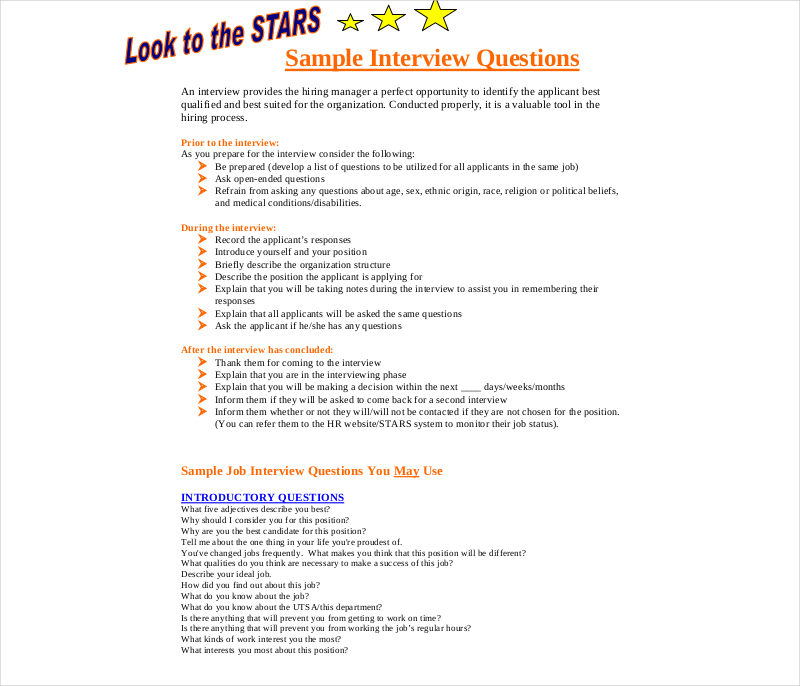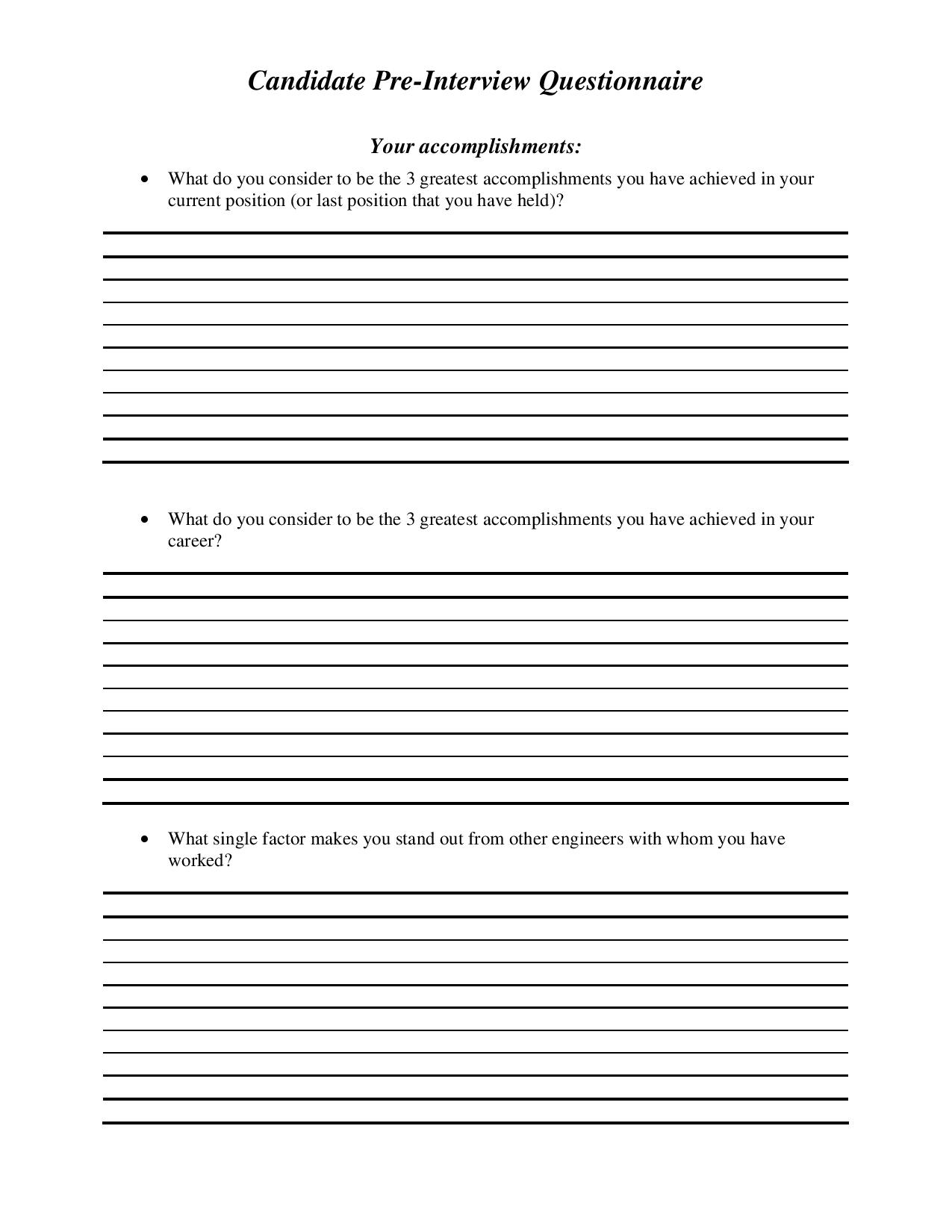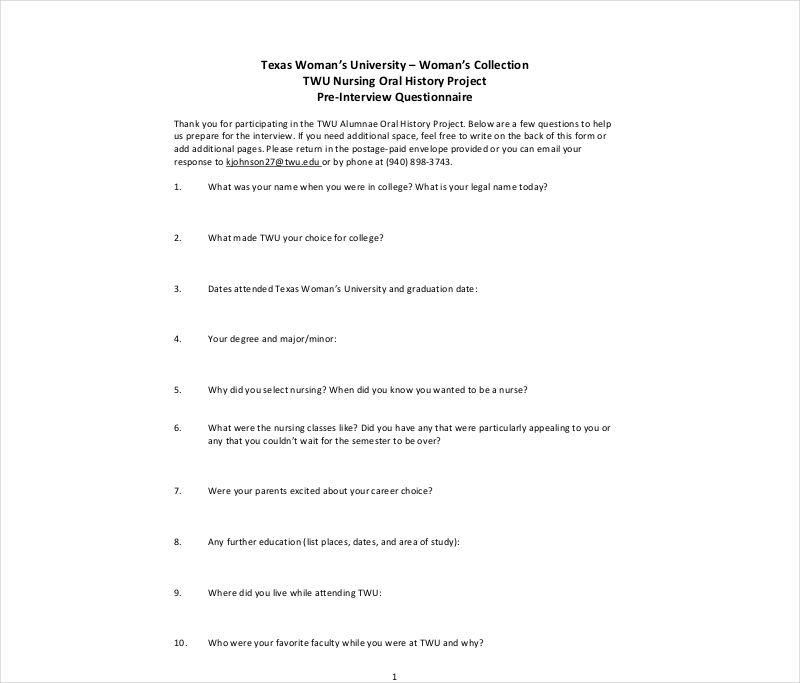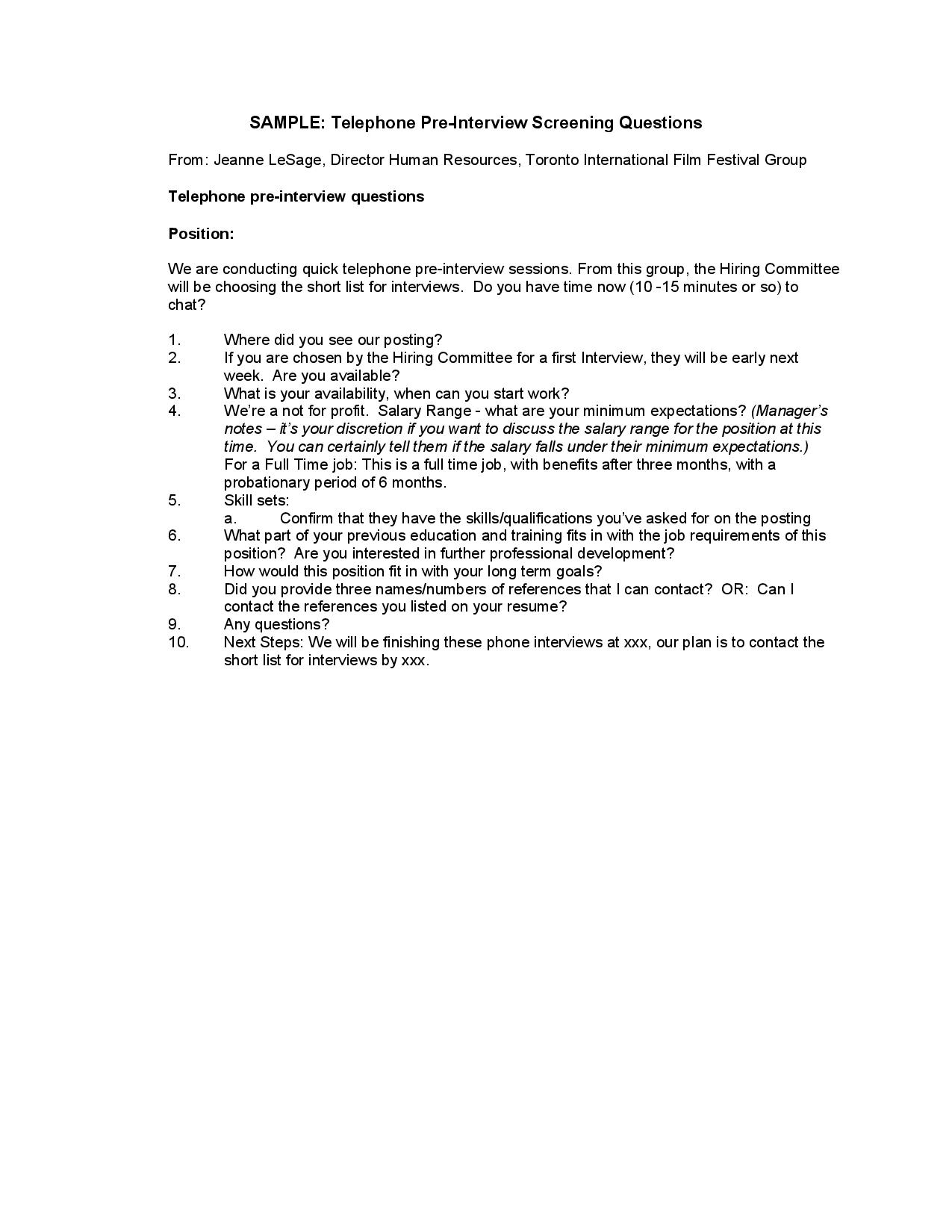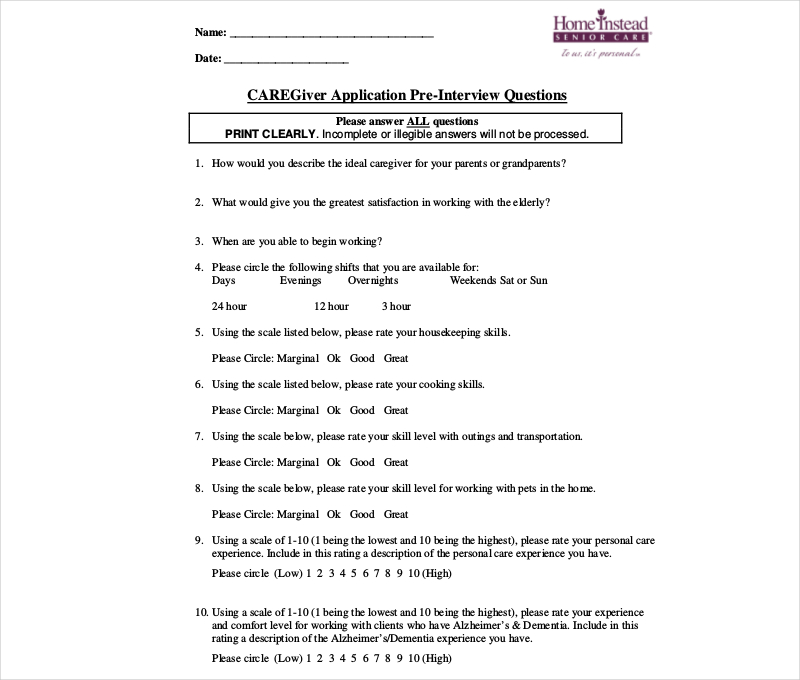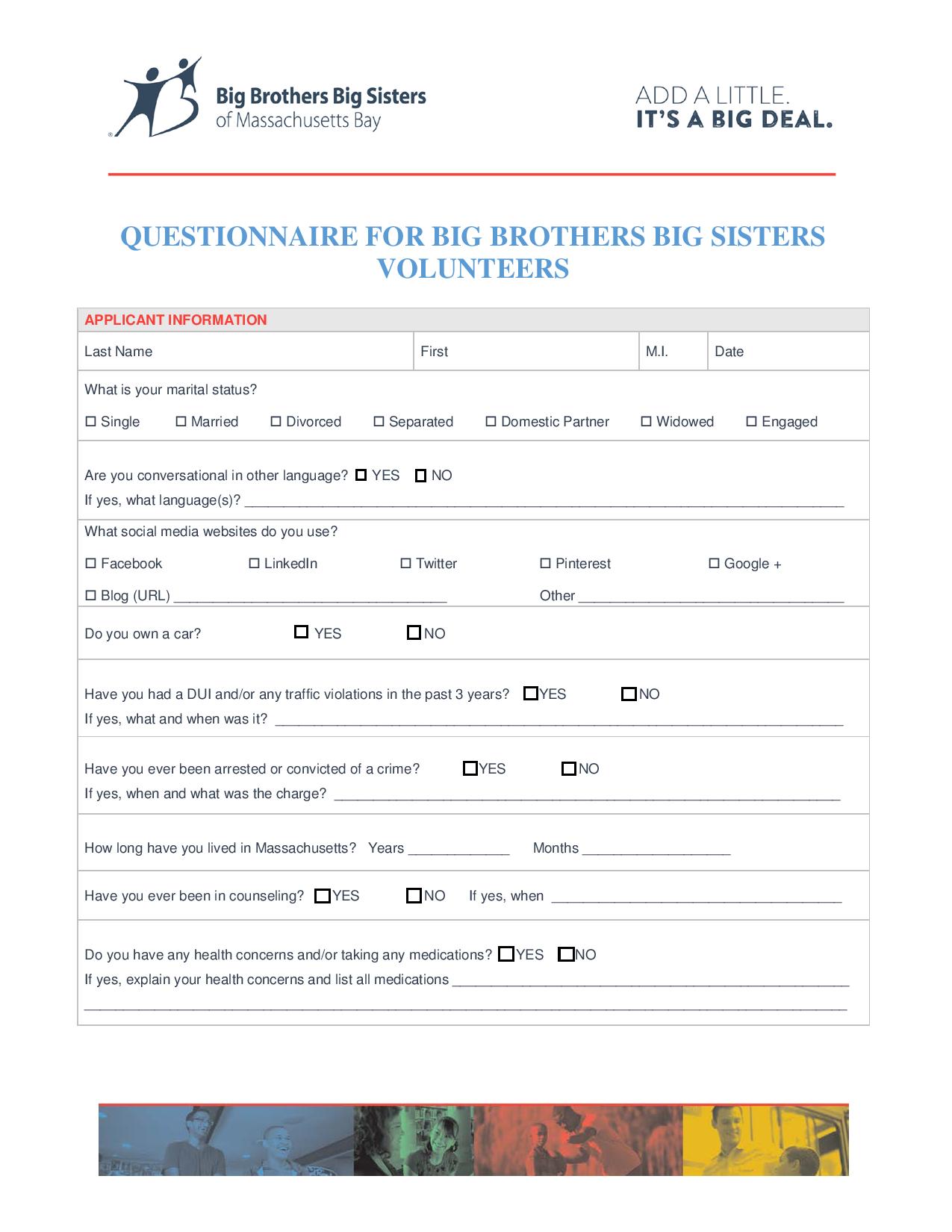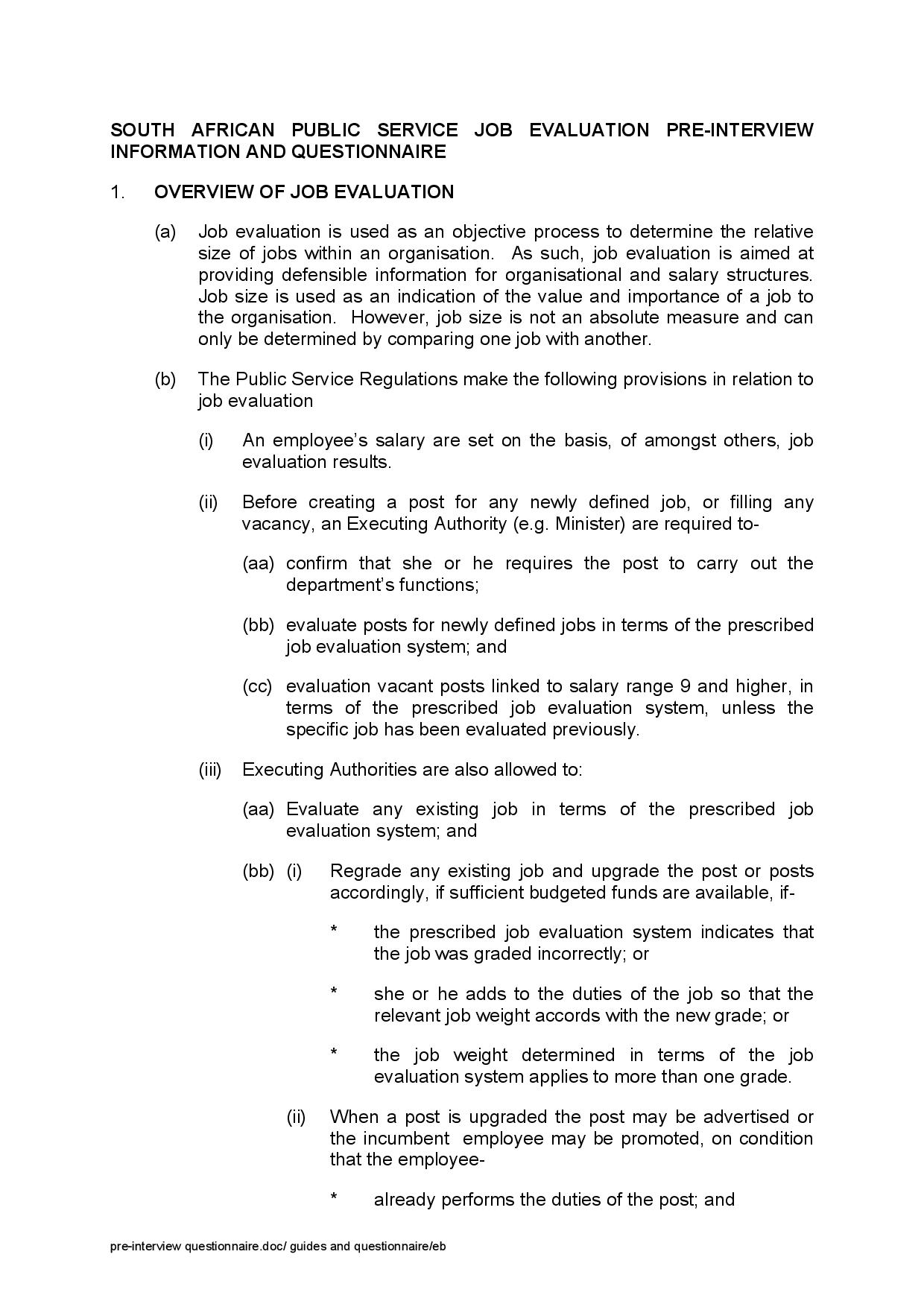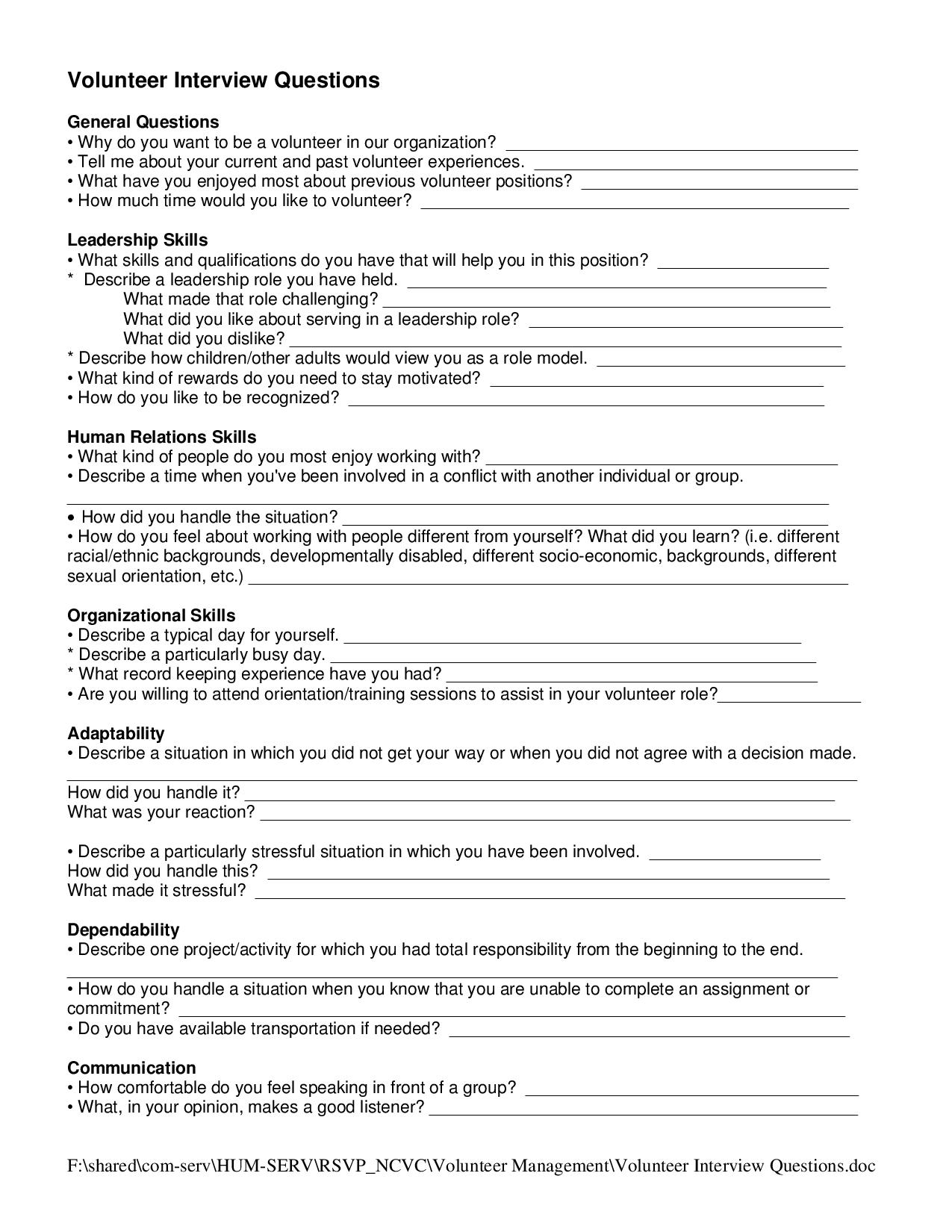8+ Pre-Interview Questionnaires Examples to Download
Do you just ever feel that frustration that rises in the aging hours of the night from overthinking and be anxious about the questions that will be asked in your job interview tomorrow? This is the kind of night where you just want to get a good night sleep but you just can’t because your mind keeps on thinking about the possible questions you will be forced to answer and make certain that your answers display your commitment towards the future tasks that will be handed to you by your supervisors not minding about the levels of difficulty.
Interviews usually have pre-interview questionnaires which you can answer online or on a sheet of paper depending on the company. Pre-interview questionnaires are important to the company for this allows them to know if you truly are fitting for the position your desire. This is mainly because there might be questions which will not be asked in the other phases of the interview and to answer all ambiguities that can be spotted in your resume, that is if it is not crafted well.
If you still can’t get a good night sleep from thinking what questions will be asked during the pre-interview phase, then count this article as your effective placebo sleeping pill for nights like this.
Sample Interview Questionnaires
Candiate Pre-Interview Questionanaire
Nurse Pre-Interview Questionnaire
Telephone Pre-Interview Screening Questionnaires
Understanding the Importance of Pre-Interview Questionnaires
Before we get into the sample questions that are commonly present in pre-interview questionnaires, it is necessary for you to get a good understanding of its essentials. Knowing the essential and the purpose of this type of questionnaire allows you to think critically; thereby, acing all the questions asked in it. You may also see the questionnaire templates.
In the early phases of an interview, the talent acquisition or recruitment department will lead you into a room and hand you a piece of paper or open their company recruitment website that contains questions relevant to the position you desire and other positions that the company offers. Your knowledge will be gauged thoroughly and then they will determine if you are a good fit for the position you are applying for. If not, they will take note of your answers with or without plans to assign you to another position depending on the availability of other positions or departments and check how everything turns out with the other phases of the interview. You may also see the client questionnaire.
Given that important questions are already provided in the pre-interview questionnaires, the interview that is going to be conducted by the recruitment specialist would no longer be time-consuming. Additionally, with both your answers from the oral interview or final phase of the interview and from the pre-interview questionnaire it will be easy for the talent acquisition department to come to a verdict. Having this stated, you have to be mindful of all the information on your resume, application letter, and your answers during the different phases of the interview because a contradiction of information that you are going to provide the recruitment specialist, no matter how much you consider it as something insignificant, can be the major factor why you will not be hired by the company.
Care Giver Pre-Interview Questionnaire
Although pre-interview questionnaires come with questions that go into the specifics of a particular position, they are general and situational that usually manifest in all pre-interview questionnaire. Even if you are applying for a managerial position, the general and situational questions still retain for these are the types of question that best gauge your personality towards handling circumstances that have a huge and minimal probability of happening and how well you can handle them. Both the general and situational questions attest the information that you have provided in your resume, so it is best you study your resume well for your answers not to contradict the information in your resume. You may also see the Questionnaire Examples in PDF.
Usually, a pre-interview questionnaire starts with recruiting-related questions. Below are sample questions that are found in the recruiting-related questions of a pre-interview questionnaire.
- Where or how did you know about the availability of the position?
- Do you have any pending interviews with other companies?
- What is the minimum starting pay you are expecting for this position?
- What makes you want to work with us?
- List of companies that you have worked with in the past including the span of time that you had been a part of them.
- Aside from your internship program, do you have other working experiences?
- If so, what were your responsibilities?
- List of character references.
- Upon hire, how soon could you start?
- Upon hire, could you present personal documents as legal proof as part of the job requirements?
- Upon hire, would you be willing to undergo a medical examination?
- Have you worked with this company before?
- If so, what was the reason for leaving?
- If so, what makes you want to reapply?
- What other positions are you applying for?
- If currently employed, what would be the best retention offer to keep you from your current company?
- If currently unemployed, what is the reason for leaving the most recent company?
After the recruiting-related questions, it is then followed by the general questions. Sample questions for this part are as listed below: You may also see the Assesment Questionnaires.
- What is your edge? or, What can you offer us that someone else cannot?
- What are your weaknesses?
- What skills do you possess which can be deemed useful and be applied in the operations of the business?
- What knowledge areas and technical skills are your strongest?
- Can you work well with a team?
- Which are you better at, working individually or working with a team?
- Are there any skill or skills you possess that is or are not present on your resume?
- Could you present a portfolio of your latest outputs?
- Where do you see yourself in ten years?
- How will you become an asset to this company?
The general questions are then followed by situational questions. Situational questions allow the recruitment specialists to know how well you handle issues, should there be an occurrence of major or minor conflict in the office. The list below are examples of situational questions.
- What was the direst circumstance you had come to face with and how did you handle it?
- During the busiest hours of business operations, one of your teammates is struggling with their tasks, for your employer has bombarded him with a variety of tasks. He asked for your help while you are busy doing your tasks. What would you do?
- There are instances in businesses where bad news needs to be delivered, how will you relay the grave news to your teammate or manager?
- A consumer calls for a complaint policy about a rise in her bill that she is unaware of. Before the issue is discussed, she talks about her deceased husband whom she continues to adore despite the physical absence. You are aware that she’s using this approach for her bill to be lowered down. How will you sympathize and resolve the issue at the same time?
- Would you rather go for the job you don’t want but pays great or the job you have been dreaming of but pays lesser than the other? Why?
- If you are the CEO of a company, which area or department would you focus more on for the company’s progress to be continuous?
When answering these questions, you have to make certain that you are fully aware of your other answers from seemingly similar questions, most especially in the situational questions. This is for you not to come up with answers that contradict your other answers.
Pre-Interview Questionnaire for Volunteer
Public Service Pre-Interview Questionnaire
Volunteer Interview Questionnaire
Tips for Acing the Questions in a Pre-Interview Questionnaire
After reading this section of the article your close to being unified eyebrows you have from the creasing caused by worry will certainly come to an end and you can definitely get a good night’s sleep with relaxed muscles of your face. We provide you with tips that can help you out in the first phases of your forthcoming interview. Commit the list of tips in this article and your chances of getting hired increases. You may also see the Hr Questionnaire.
1. Be Consistent with Your Answers
When answering these questions, you have to make certain that you are fully aware of your other answers from seemingly similar questions, most especially in the situational questions. This is for you not to come up with answers that contradict your other answers. Pre-interview questionnaires are pretty tricky that applicants barely notice the relevance of various questions that are being asked. The circumstances or names may differ but if you sense that the question is closely similar or related to the question you have already answered take no risks and come up with an answer that is closely similar or relevant to the answer you have.
2. Be Sure to Study Your Resume
One of the purposes of the pre-interview questionnaire is to gauge how factual the information is that you have put on your resume. Your answers need to match the information you incorporate in your resume for a comparison will be made once recruitment evaluation questionnaire will be conducted. If your answers jeopardize some information you put on the resume, your chances of getting hired decreases drastically.
3. Never Beat Around the Bushes
Most beating around the bushes cases happens in situational questions. Don’t waste the lines being provided in the questionnaire by repeating your point and adding unnecessary fillers in each sentence. Your answer does not have to be very lengthy to impress recruitment specialist. A brief answer with a complete thought is far more acceptable than one that is longer that lacks sense. For example, the question A consumer calls for a complaint about a rise in her bill that she is unaware of. Before the issue is discussed, she talks about her deceased husband whom she continues to adore despite the physical absence. You are aware that she’s using this approach for her bill to be lowered down. How will you sympathize and resolve the issue at the same time? You may also see the Feedback Questionnaire.
Answer: My condolences to you and your family; I know how hard it is to lose the people we adore the most for I bear witness to the pain of my friend as he lost his wife last year. And, to think that the rate increase that manifests in your current bill does nothing to your grief but exacerbate it. But, don’t worry for you have me who is so much willing to help in clarifying the issue at hand. For me to help you out I will be asking questions and I need you to fully cooperate with me so we can both sort things out, okay?
In this example, though lengthy, the sample answer makes a good transition in sympathizing with the consumer and stating a guarantee statement by giving the customer the assurance of your willingness to help her with the bill. Some applicants like to overdo things that once the resolution has been made or the guarantee statement has been stated, they go back to sympathizing. It’s a total waste of space and displays how disorganized your thoughts are.
4. Be Honest with Your Answers
If you are being honest with your answers and information you put in your resume, your prospective employer will draw the lines of your limits which he or she will be gladly assisting when faced with your limits in the future. One common example for this is claiming that you are an expert in Microsoft Excel and PowerPoint when you are completely oblivious to these programs. This claim can have a negative impact on the future if one of your managers tells you to do something you are incapable of doing. Of course, you can’t tell your manager that what you put on the resume or your answers for questions about skills and capabilities are mere lies. That would be a fatal blow to your professional growth. Just because you are incapable of doing somethings and desperately want the job position it doesn’t mean you have to lie your way into it.You may also see the Marketing Questionnaire.
5. Review Your Answers
This is one of the most important tips that you must follow and never forget. After finishing the exam you have to review your answers before submitting for there might be important points that you have missed out, obvious grammatical errors or lack of words that make a sentence suggest another point, and also for you to strengthen the points you think are weak upon reviewing. Don’t be tempted by laziness and submit the questionnaire without reviewing your answers for that’s like relying on a dice’s rolling. If you really think that the job position you are applying for is essential for the growth of your career goals, you must realize that there are things not far from your control which can be prevented.
Pre-interview questionnaires are tools that applicants must take seriously. Through this recruitment tool, gauging the skills and determining how docile an applicant is made easy. All companies don’t want to hire incompetent employees that will only become liabilities in the future. The questions in the pre-interview questionnaire can spot who these applicants are throughout the whole phase of the interview. If an incompetent applicant who fakes some information in the resume applies in a company, there is a good chance that he or she can be spotted immediately by the recruitment specialists just by looking at their answers; thereby, the chances of being endorsed to other phases of interview becomes negative. You may also see the Student Questionnaire.



